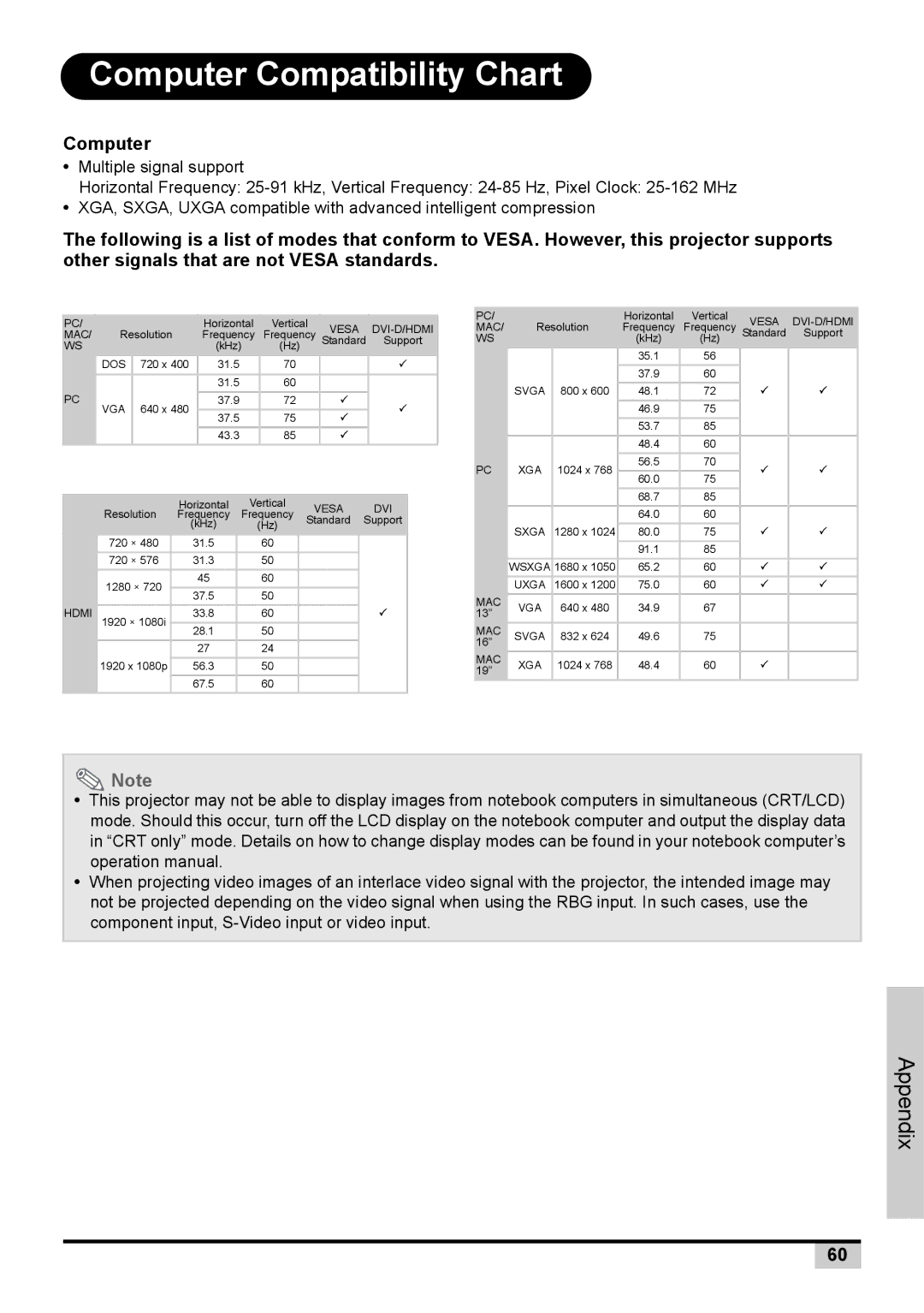
Computer Compatibility Chart
Computer
•Multiple signal support
Horizontal Frequency:
•XGA, SXGA, UXGA compatible with advanced intelligent compression
The following is a list of modes that conform to VESA. However, this projector supports other signals that are not VESA standards.
| PC/ |
|
|
|
|
| Horizontal | Vertical | VESA | |||||||
| MAC/ | Resolution |
|
| Frequency | Frequency | ||||||||||
|
|
| Standard | Support | ||||||||||||
| WS |
|
|
|
|
| (kHz) | (Hz) |
|
|
|
|
| |||
|
| DOS | 720 x 400 |
| 31.5 |
| 70 |
|
|
|
| 3 |
| |||
|
|
|
|
|
|
|
|
|
|
|
|
|
|
|
|
|
|
|
|
|
|
|
| 31.5 |
| 60 |
|
|
|
|
|
| |
| PC | VGA | 640 x 480 |
| 37.9 |
| 72 |
|
| 3 |
| 3 |
| |||
|
|
| 37.5 |
| 75 |
|
| 3 |
|
| ||||||
|
|
|
|
|
|
|
|
|
|
|
|
| ||||
|
|
|
|
|
|
| 43.3 |
| 85 |
|
| 3 |
|
|
| |
|
|
|
|
|
|
|
|
|
|
|
|
|
|
|
|
|
|
|
|
|
| Horizontal |
| Vertical |
| VESA |
| DVI |
| ||||
|
| Resolution |
| Frequency |
| Frequency |
|
|
| |||||||
|
|
|
|
| Standard | Support |
| |||||||||
|
|
|
|
|
| (kHz) |
|
| (Hz) |
|
| |||||
|
| 720 × 480 |
|
| 31.5 |
|
| 60 |
|
|
|
|
|
| ||
|
| 720 × 576 |
|
| 31.3 |
|
| 50 |
|
|
|
|
|
| ||
|
| 1280 × 720 |
|
| 45 |
|
| 60 |
|
|
|
|
|
| ||
|
|
|
| 37.5 |
|
| 50 |
|
|
|
|
|
| |||
|
|
|
|
|
|
|
|
|
|
|
|
|
| |||
| HDMI | 1920 × 1080i |
|
| 33.8 |
|
| 60 |
|
|
|
| 3 |
| ||
|
|
|
| 28.1 |
|
| 50 |
|
|
|
|
|
| |||
|
|
|
|
|
|
|
|
|
|
|
|
|
| |||
|
|
|
|
|
| 27 |
|
| 24 |
|
|
|
|
|
| |
|
| 1920 x 1080p |
|
| 56.3 |
|
| 50 |
|
|
|
|
|
| ||
|
|
|
|
|
| 67.5 |
|
| 60 |
|
|
|
|
|
| |
| PC/ |
|
|
| Horizontal | Vertical | VESA | |
| MAC/ | Resolution |
| Frequency | Frequency | |||
|
| Standard | Support | |||||
| WS |
|
|
| (kHz) | (Hz) |
|
|
|
|
|
|
| 35.1 | 56 |
|
|
|
|
|
|
| 37.9 | 60 |
|
|
|
| SVGA | 800 x | 600 | 48.1 | 72 | 3 | 3 |
|
|
|
|
| 46.9 | 75 |
|
|
|
|
|
|
| 53.7 | 85 |
|
|
|
|
|
|
| 48.4 | 60 |
|
|
| PC | XGA | 1024 x 768 | 56.5 | 70 | 3 | 3 | |
| 60.0 | 75 | ||||||
|
|
|
|
|
|
| ||
|
|
|
|
| 68.7 | 85 |
|
|
|
|
|
|
| 64.0 | 60 |
|
|
|
| SXGA | 1280 x | 1024 | 80.0 | 75 | 3 | 3 |
|
|
|
|
| 91.1 | 85 |
|
|
|
| WSXGA | 1680 x | 1050 | 65.2 | 60 | 3 | 3 |
|
| UXGA | 1600 x | 1200 | 75.0 | 60 | 3 | 3 |
| MAC | VGA | 640 x | 480 | 34.9 | 67 |
|
|
| 13” |
|
| |||||
|
|
|
|
|
|
|
| |
| MAC | SVGA | 832 x | 624 | 49.6 | 75 |
|
|
| 16” |
|
| |||||
|
|
|
|
|
|
|
| |
| MAC | XGA | 1024 x 768 | 48.4 | 60 | 3 |
| |
| 19” |
| ||||||
|
|
|
|
|
|
|
| |
![]() Note
Note
•This projector may not be able to display images from notebook computers in simultaneous (CRT/LCD) mode. Should this occur, turn off the LCD display on the notebook computer and output the display data in “CRT only” mode. Details on how to change display modes can be found in your notebook computer’s operation manual.
•When projecting video images of an interlace video signal with the projector, the intended image may not be projected depending on the video signal when using the RBG input. In such cases, use the component input,
Appendix
60
